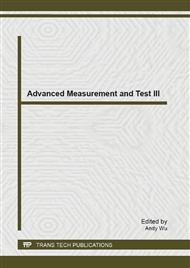[1]
E. Candes and M. Wakin, An introduction to compressive sampling, IEEE SPM 25 (2008) 21-30.
Google Scholar
[2]
E. Candes, The restricted isometry property and its implications for compressed sensing, Comptes Rendus Mathematique. 346 (2008) 589-592.
DOI: 10.1016/j.crma.2008.03.014
Google Scholar
[3]
E. Candes, T. Tao, Decoding by linear programming, IEEE TIT 51 (2005) 4203-4215.
DOI: 10.1109/tit.2005.858979
Google Scholar
[4]
S. Foucart, Hard thresholding pursuit: an algorithm for compressive sensing, SINUM 49 (2011) 2543-2563.
DOI: 10.1137/100806278
Google Scholar
[5]
T. Blumensath and M. Davies, Iterative hard thresholding for compressed sensing, App. and Comp. Harmonic Anal. 27 (2009) 265-274.
DOI: 10.1016/j.acha.2009.04.002
Google Scholar
[6]
D. Needell, J. Tropp, Cosamp: Iterative signal recovery from incomplete and inaccurate samples, App. and Comp. Harmonic Anal. 26 (2009) 301-321.
DOI: 10.1016/j.acha.2008.07.002
Google Scholar
[7]
T. Blumensath, Accelerated iterative hard thresholding, Signal Processing 92 (2012) 752-756.
DOI: 10.1016/j.sigpro.2011.09.017
Google Scholar
[8]
R. Baraniuk, V. Cevher, M. Duarte, C. Hegde, Model-based compressive sensing, IEEE TIT 56 (2010) 1982-2001.
DOI: 10.1109/tit.2010.2040894
Google Scholar
[9]
N. Vaswani, W. Lu, Modified-cs: Modifying compressive sensing for problems with partially known support, IEEE TSP 58 (2010) 4595-4607.
DOI: 10.1109/tsp.2010.2051150
Google Scholar
[10]
R. Carrillo, L. Polania, K. Barner, Iterative algorithms for compressed sensing with partially known support, in Proceedings, IEEE ICASSP (2010) 3654-3657.
DOI: 10.1109/icassp.2010.5495901
Google Scholar
[11]
R. Carrillo, L. Polania, K. Barner, Iterative hard thresholding for compressed sensing with partially known support, in Proceedings, IEEE ICASSP (2011) 4028-4031.
DOI: 10.1109/icassp.2011.5947236
Google Scholar
[12]
E. Candes, T. Tao, Decoding by linear programming, IEEE TIT 51 (2005) 4203-4215.
DOI: 10.1109/tit.2005.858979
Google Scholar


